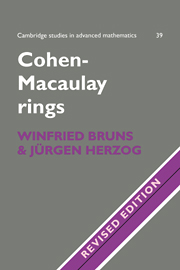Book contents
- Frontmatter
- Contents
- Preface to the revised edition
- Preface to the first edition
- I Basic concepts
- II Classes of Cohen–Macaulay rings
- 5 Stanley–Reisner rings
- 6 Semigroup rings and invariant theory
- 7 Determinantal rings
- III Characteristic p methods
- Appendix A summary of dimension theory
- References
- Notation
- Index
6 - Semigroup rings and invariant theory
Published online by Cambridge University Press: 04 December 2009
- Frontmatter
- Contents
- Preface to the revised edition
- Preface to the first edition
- I Basic concepts
- II Classes of Cohen–Macaulay rings
- 5 Stanley–Reisner rings
- 6 Semigroup rings and invariant theory
- 7 Determinantal rings
- III Characteristic p methods
- Appendix A summary of dimension theory
- References
- Notation
- Index
Summary
This chapter opens with the study of affine semigroup rings, i.e. sub-algebras of Laurent polynomial rings generated by a finite number of monomials. We relate the structure of such a ring R to that of the semi-group C formed by the exponent vectors of the monomials in R, and to the cone D spanned by C. From the face lattice of D we then construct a complex for the local cohomology of R.
The connection between R and D is strongest if R is normal: this is the case if and only if R contains all monomials which correspond to the integral points in D. By a theorem of Hochster normal semigroup rings are Cohen–Macaulay. Moreover, we shall determine their canonical modules and, as a combinatorial application, derive the reciprocity laws of Ehrhart and Stanley.
We are led to the second topic of this chapter by the fact that rings of invariants of torus actions are normal semigroup rings. We also treat finite groups, covering Watanabe's characterization of Gorenstein invariants and the famous Shephard–Todd theorem on invariants of reflection groups. The discussion of invariant theory culminates in the Hochster–Roberts theorem which warrants the Cohen–Macaulay property for rings of invariants of all linearly reductive groups.
Affine semigroup rings
An affine semigroup C is a finitely generated semigroup which for some n is isomorphic to a subsemigroup of containing 0. Let k be a field. We write k[C] for the vector space k(C), and denote the basis element of k[C] which corresponds to c ∈ C by Xc.
- Type
- Chapter
- Information
- Cohen-Macaulay Rings , pp. 256 - 299Publisher: Cambridge University PressPrint publication year: 1998



